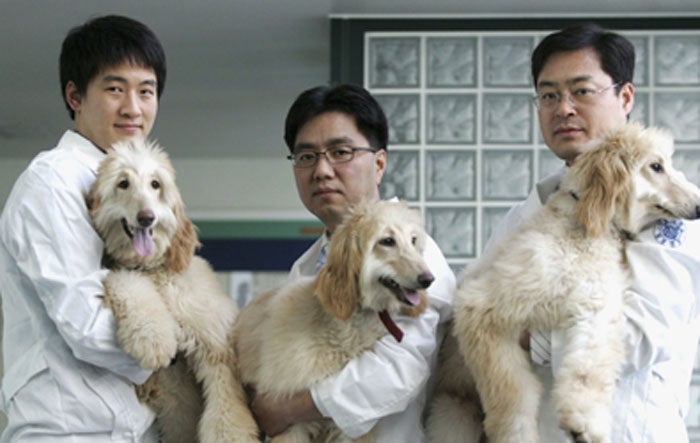How much is that cloned doggie in the window?

Your support helps us to tell the story
From reproductive rights to climate change to Big Tech, The Independent is on the ground when the story is developing. Whether it's investigating the financials of Elon Musk's pro-Trump PAC or producing our latest documentary, 'The A Word', which shines a light on the American women fighting for reproductive rights, we know how important it is to parse out the facts from the messaging.
At such a critical moment in US history, we need reporters on the ground. Your donation allows us to keep sending journalists to speak to both sides of the story.
The Independent is trusted by Americans across the entire political spectrum. And unlike many other quality news outlets, we choose not to lock Americans out of our reporting and analysis with paywalls. We believe quality journalism should be available to everyone, paid for by those who can afford it.
Your support makes all the difference.Forget Dolly the sheep and make way for Booger the pitbull.
Canine lovers can take comfort in the fact that death need not spell the end for their beloved animals, now that a South Korean company has taken its first order to clone a pet pooch.
A Seoul-based firm has agreed to replicate a dead pitbull belonging to an American woman, Bernann McKunney. The dog in question is suitably special – Booger is said to have come to Ms McKunney's rescue when she was savaged by another dog, which bit off her arm.
Ra Jeong-Chan, the chief executive of the biotechnology firm RNL Bio, told The Korea Times: "It seems that she had a disability and her dog helped her cope with the problem, so she was eager to get a clone of Booger."
The Korean scientists will be using DNA from the pitbull's ear tissue – which Ms McKunney had preserved before her pet died 18 months ago. There is a one in four chance that the cloning process will be successful, and Ms McKunney will not have to pay the $150,000 (£76,000) fee unless she receives a new pet.
The cells from Booger's ear tissue have been inserted into the ova of other dogs, and then implanted into eight female "carrier" dogs. Booger Mark 2 should be delivered next February.
The company claims to be the first biotechnology firm to offer this service commercially, and expects to receive hundreds of orders from other people loathe to lose their canine companions.
RNL Bio believes that the move will be especially popular in Europe and the US. "There are many people who want to clone their pet dogs in Western countries, even at this high price" said Ra Jeong-Chang.
The company also signed a preliminary deal with the South Korean customs service last summer to clone drug-sniffing dogs. This work is being carried out by a team of scientists from Seoul's National University, where the first dog was cloned in 2005. The Afghan hound Snuppy was the result of pioneering research by the infamous stem-cell scientist Dr Hwang Woo-Suk.
Dr Hwang was internationally celebrated in 2004 after he claimed to have successfully cloned 30 human embryos. Time magazine listed him as one of the year's most influential people and he was revered as a national hero, yet it was later revealed that most of his claims were fraudulent. The university expelled him and the government rescinded its financial and legal support for human egg cloning.
He is currently on trial for embezzlement and fabricating research.
Leading RNL Bio's new project is Professor Lee Byeong-Chun, who worked with Dr Hwang Woo-Suk on some of his most ground-breaking research.
The company also has strong links with the North of England. Since the end of January, RNL Bio has been running a research programme at Newcastle University's medical school – where it is developing stem-cell therapy products for diseases – while funding projects at the North East England Stem Cell Institute.
Join our commenting forum
Join thought-provoking conversations, follow other Independent readers and see their replies
Comments